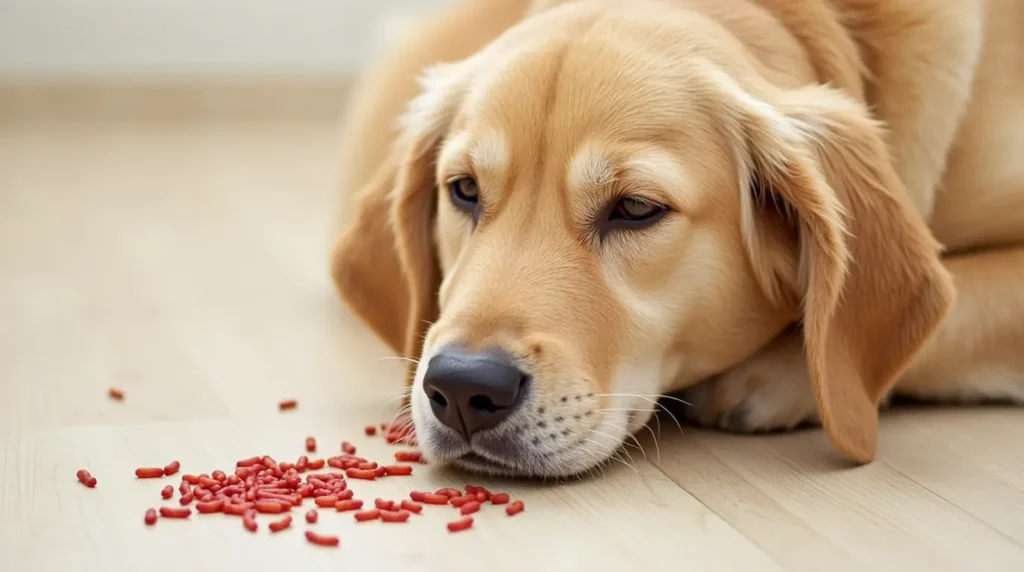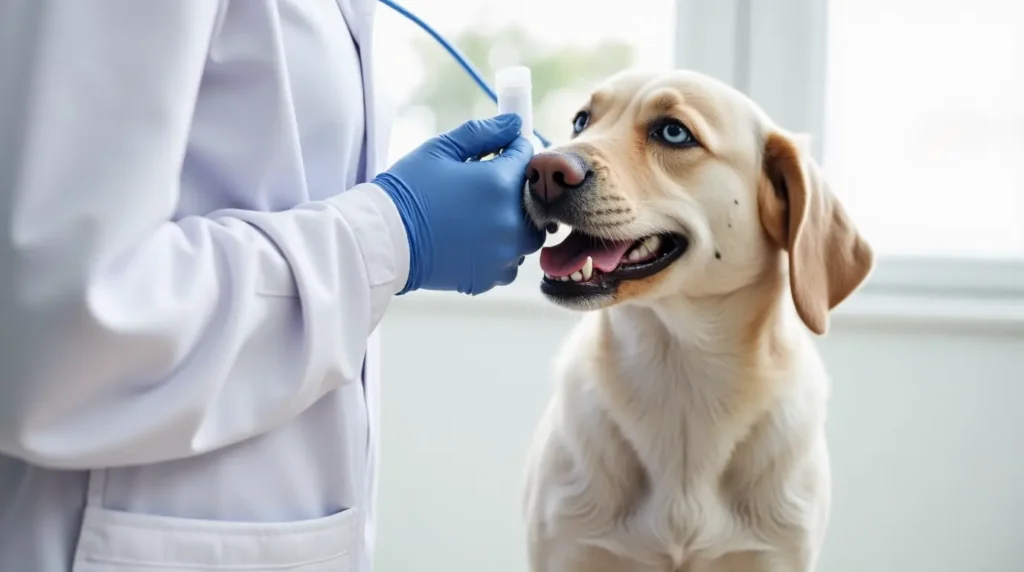Hookworms in dogs symptoms: 5 Signs you should never ignore
Hookworms in dogs are one of the most common parasites affecting pets, but their impact often goes unnoticed until significant health issues arise. These tiny parasites might be out of sight, but their presence in your dog’s body can lead to severe complications. Understanding hookworms, their symptoms, and how to prevent them is essential for every pet owner who wants to safeguard their furry companion’s health.
Why Hookworms Are a Serious Concern for Dogs

Hookworms might be small, but their effect on your dog’s health can be enormous. These blood-sucking parasites attach themselves to the lining of the intestines, causing blood loss, nutritional deficiencies, and, in severe cases, death. Left untreated, hookworm infections can lead to chronic issues and even spread to other animals or humans.
What Are Hookworms
- Overview of Hookworm Infections in Dogs
Hookworms are intestinal parasites that belong to the Ancylostomatidae family. They are microscopic but cause significant damage by feeding on the blood of their host.
- How Dogs Get Infected With Hookworms
Dogs typically get infected through contaminated soil, ingestion of infected larvae, or direct skin penetration. Puppies can also acquire hookworms from their mother’s milk.
- The Lifecycle of Hookworms in a Dog’s Body
Once inside the dog’s body, hookworm larvae migrate to the intestines, where they mature and reproduce. The eggs are excreted in the dog’s feces, contaminating the environment and continuing the cycle.
Hookworms are small, bloodsucking parasites that live in a dog’s intestines, causing anemia and weakness. Unlike the round worm, hookworms latch onto the intestinal walls, feeding directly on blood. They spread through contaminated soil, ingestion, or skin contact. Early detection and treatment are vital to prevent severe health complications in affected dogs.
- hookworms in dogs poop
Hookworms are intestinal parasites that feed on blood, causing anemia and weakness in dogs. They are often identified by symptoms like weight loss and the presence of hookworms in dogs poop, which may contain eggs or adult worms. These parasites spread through contaminated environments, making prevention and prompt treatment essential for your dog’s health.
The Dangers of Hookworms
How Hookworms Impact a Dog’s Health
Hookworms can cause anemia, weight loss, and malnutrition. In puppies, the rapid blood loss can be life-threatening.
Potential Complications If Left Untreated
If untreated, hookworm infections can result in severe anemia, organ damage, and a weakened immune system.
Recognizing Hookworms in Dogs Symptoms

The 5 Signs You Should Never Ignore
- Unexplained Weight Loss
Even with a healthy appetite, infected dogs may lose weight due to blood and nutrient loss. - Chronic Diarrhea or Soft Stools
Diarrhea, often with blood or mucus, is a hallmark sign of hookworm infection. - Lethargy and Weakness
Anemia caused by hookworms can sap your dog’s energy, leaving them unusually tired. - Pale Gums and Anemia Symptoms
Check your dog’s gums. Pale gums are a critical indicator of anemia and blood loss. - Itchy or Irritated Skin
Skin irritation, especially on the paws, can occur when larvae penetrate the skin.
Why Early Detection Is Crucial
How Early Intervention Can Save Your Dog’s Health
Timely diagnosis and treatment can prevent serious health issues, improving your dog’s prognosis.
The Risks of Ignoring Symptoms
Delaying treatment can lead to severe complications, including irreversible organ damage.
Diagnosing Hookworm Infections in Dogs

Common Diagnostic Tests Used by Veterinarians
Fecal examinations are the primary method for detecting hookworm eggs in stool samples.
When to Visit the Vet for Suspected Hookworms
If your dog shows any symptoms, especially anemia or diarrhea, a vet visit is imperative.
How Hookworms Spread Among Dogs
Understanding Transmission Routes
Hookworm eggs and larvae thrive in contaminated soil, spreading through ingestion or skin contact.
Preventing the Spread in Multi-Pet Households
Quarantine infected dogs, clean the environment thoroughly and maintain regular deworming schedules.
hookworms in dogs treatment
Hookworms in dogs are a serious health threat, causing symptoms like weight loss, anemia, and lethargy. These parasitic worms are often contracted through contaminated environments or from mother to puppy.
Fortunately, hookworms in dogs treatment is available. Veterinarians typically prescribe deworming medications that effectively eradicate the parasites. In severe cases, additional treatments may be required to address anemia or other complications.
Regular vet visits, along with fecal testing, are essential for maintaining your dog’s health and preventing reinfection. Early diagnosis and swift treatment ensure a quicker recovery and help keep your dog strong and healthy.
Treatment Options for Hookworms in Dogs
Common Deworming Medications
Anthelmintic drugs like fenbendazole or pyrantel pamoate are effective against hookworms.
Follow-Up Care and Prevention Strategies
After treatment, ensure follow-up fecal tests to confirm the infection is cleared.
Preventing Hookworm Infections
Regular Deworming Schedules
Stick to a vet-recommended deworming routine to keep your dog parasite-free.
Safe Practices for Outdoor Environments
Avoid letting your dog roam in areas likely to be contaminated with feces.
Importance of Fecal Testing
Regular fecal exams help catch infections early, even before symptoms arise.
Hookworms in Puppies vs. Adult Dogs
Why Puppies Are at Higher Risk
Puppies are more susceptible due to their immature immune systems and possible transmission from their mothers.
How Treatment and Prevention Differ by Age
Puppies require more frequent deworming, while adults benefit from regular preventative care.
Can Hookworms Affect Humans
Risks of Zoonotic Transmission
Hookworms can infect humans through skin contact with contaminated soil, causing a condition known as cutaneous larva migrans.
Tips to Protect Your Family
Wear gloves when handling soil or dog waste, and maintain proper hygiene practices.
When to Consult a Veterinarian
Signs That Require Immediate Medical Attention
Severe anemia, persistent diarrhea, or rapid weight loss warrant urgent veterinary care.
Questions to Ask Your Vet During the Visit
Inquire about deworming schedules, preventive measures, and potential dietary adjustments.
Myths and Misconceptions About Hookworms in Dogs
Debunking Common Myths About Hookworms
Contrary to belief, indoor dogs can still get hookworms. Also, not all symptoms are immediately obvious.
Understanding Facts vs. Fiction
Educating yourself about hookworms helps dispel fears and ensures informed decision-making.
Summary and Key Takeaways
Recognizing the symptoms of hookworms early is crucial for effective treatment. Regular deworming, proper hygiene, and vet check-ups are vital steps to protect your dog’s health.
FAQs about Hookworms in dogs
What are the symptoms of hookworm in dogs?
Hookworms in dogs are parasitic worms that feed on blood, causing anemia, weakness, and weight loss. Wondering what are the symptoms of hookworm in dogs? Look for pale gums, diarrhea, and lethargy. These small but harmful parasites can quickly impact your dog’s health, so early detection and prompt treatment are crucial for recovery.
How do you get rid of hookworms in dogs?
Hookworms in dogs can cause severe health issues, including anemia and weight loss. Wondering how do you get rid of hookworms in dogs? Deworming medications prescribed by a veterinarian are the most effective solution. Follow-up care, including fecal testing, ensures complete eradication. Prompt treatment is vital to protect your dog’s health and well-being.
How serious is hookworm in dogs?
Hookworms in dogs are a serious concern that can lead to severe health problems like anemia, weakness, and lethargy. So, how serious is hookworm in dogs? If left untreated, it can cause lasting damage to your dog’s organs and overall health. Prompt diagnosis and treatment are essential to avoid life-threatening complications.
Call to Action
Schedule a check-up with your veterinarian today to ensure your dog is protected. Prevention is always better than cure, so prioritize regular care and awareness.




